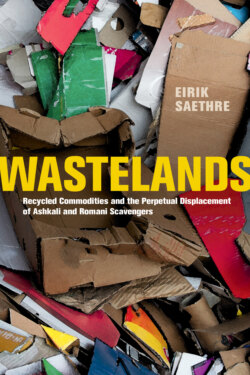Wastelands

Реклама. ООО «ЛитРес», ИНН: 7719571260.
Оглавление
Eirik Saethre. Wastelands
Wastelands. RECYCLED COMMODITIES AND THE PERPETUAL DISPLACEMENT OF ASHKALI AND ROMANI SCAVENGERS
Contents
Acknowledgments
Introduction. THE OTHER WORLD
VISIBLE INVISIBILITY
EXCLUDED PEOPLE AND DISCARDED COMMODITIES
EVICTIONS AND ADVOCACY
SUFFERING AND BOREDOM
1. The Sociality of Exception
POLJE’S NEWEST INHABITANTS
YUGOSLAV ROMANI FAMILIES
BAYASH WEALTH
NETWORKS OF RECYCLED CAPITAL
VOLATILE RELATIONSHIPS
2. Precarious Domesticity
BUILDING A SHACK, MAKING A HOME
FOOD INSECURITY
WIRED
DESTRUCTION AND RECONSTRUCTION
3. Abject Economies
DUMPSTER IDENTITIES
CARDBOARD, COOPERATION, AND CORPORATIZATION
SCRAP METAL
THE UNCERTAINTY OF MARKETS
WAGE LABOR AND BEGGING
4. Constrained Aspirations
A BUREAUCRACY FOR DISPLACED PERSONS
ROMANI HORSES
CLEANING UP
IMPERFECT TRANSFORMATIONS
5. Relocations
FROM SHACKS TO HOUSES
STATE REMOVALS, STATE RESETTLEMENT
YOU CANNOT EAT A HOUSE
SEEKING ASYLUM
Conclusion. JEBEM TI ŽIVOT
SQUEEZED
SCAVENGING CIGANI
PAPER LIVES
Notes. INTRODUCTION
CHAPTER ONE. THE SOCIALITY OF EXCEPTION
CHAPTER TWO. PRECARIOUS DOMESTICITY
CHAPTER THREE. ABJECT ECONOMIES
CHAPTER FOUR. CONSTRAINED ASPIRATIONS
CHAPTER FIVE. RELOCATIONS
CONCLUSION
Bibliography
Index
Отрывок из книги
Eirik Saethre
UNIVERSITY OF CALIFORNIA PRESS
.....
These relationships were driven by the enduring materiality of discarded commodities. Contrary to popular wisdom, an item’s worth is not extinguished when it is thrown away. A shirt in the dumpster is still a shirt and, once removed, can continue to fulfill its function as clothing. Ultimately, trash is an arbitrary state that need not be permanent. Commoditization is an ongoing process that lasts long after a thing is produced, sold, and abandoned. Appadurai notes that objects are not static but rather circulate in differing regimes of value.69 As a result, a commodity’s economic significance is tied to its social, political, and cultural framework. These differing registers allow a single item to have opposing values and meanings that are context dependent. In other words, one person’s trash is another person’s treasure. Appadurai observes that this disjuncture is particularly evident among extremely impoverished groups. For Ashkali, who had difficulty accessing commodities through ordinary channels, dumpsters provided an alternative. Consequently, an object’s trajectory is not linear but circular, necessarily moving in and out of a trash state. As items shift between categories, they acquire biographies and histories.70 Like people, commodities are socially constructed and possess social lives.
For Ashkali, trash was not just a source of material goods; it also provided symbolic capital. Recycling required fortitude, strength, and expertise. Furthermore, scavengers had to be able to identify valuable goods, know the market value of each item, and possess keen negotiating skills. They were connoisseurs, gaining their knowledge through an unconscious and measured familiarization with instruments of value.71 Personal success depended upon one’s mastery of the art of living, not institutionalized learning, wage labor, or government assistance. Parents saw their children’s future in the dumpsters, not in the classroom. Youths were encouraged to go through the trash because it taught discipline and the value of labor. When a teenage boy refused, saying girls were watching, his father angrily responded that scavenging was not embarrassing; it was honest work. Taking pride in their abilities, individuals routinely showed off their best finds, such as a pair of barely worn designer sneakers, and bragged about the money they would generate. For Ashkali, garbage was not a sign of disadvantage and desperation; it demonstrated industriousness and integrity. But to Serbs, garbage marked Belgrade’s scavengers as perpetually polluted outsiders. The very thing that seemed to promise success ensured that Ashkali remained marginal.
.....